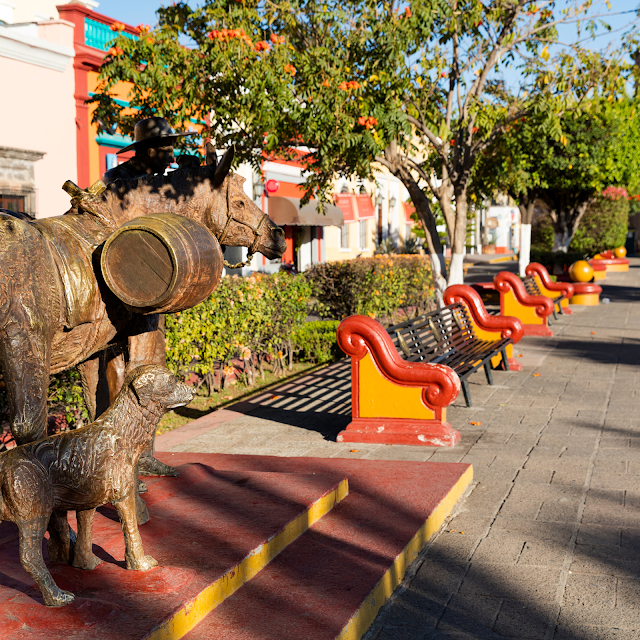Jalisco's Tequila Route: A Guide to the Best Tequila Distilleries
 |
| Tequila Jalisco |
The adventure begins in the town of Tequila itself, a charming little place nestled among the rolling hills. As you arrive, you are greeted by a warm breeze and the scent of roasting agave drifting through the cobblestone streets. The whole town hums with the energy of its namesake drink. Colorful buildings line the square, mariachi bands play lively tunes, and the shops brim with handcrafted souvenirs. But the natural treasures lie just beyond, where the historic distilleries stand like grand old storytellers, each with its own tale.
Step inside the José Cuervo distillery, the oldest and perhaps the most famous of them all, and you enter a world where tradition meets craft. The air is rich with the smell of fermenting agave, and the walls echo with the clatter of old tools and new machines. You wander through the cool, dark cellars filled with rows upon rows of oak barrels, each aging slowly, soaking up the secrets of the wood. You learn about the three types of tequila—blanco, reposado, añejo—. You taste them all, starting with the bright, fresh notes of the Blanco, moving to the smooth warmth of the reposado, and finishing with the deep, complex flavors of the añejo. Each sip tells a different story—of sun and soil, time and patience, heritage and pride.
But José Cuervo is just the beginning. Down the road, the Herradura distillery beckons from within the grand Hacienda San José del Refugio. Here, the journey takes a step back in time. The old hacienda has thick stone walls, arched doorways, and flowering gardens. You can almost hear the clip-clop of the donkeys that used to turn the stone mills, crushing the roasted agave to release its sweet juice. The ancient brick ovens still stand like old guardians, where the piñas are roasted to bring out their rich, earthy flavor. As you taste their tequila, each smooth and smoky with a hint of vanilla, you can feel the connection to the past, when making tequila was an art learned by heart and handed down through generations.
Not far away, in Amatitán, you find Casa Sauza, a distillery that combines history with innovation. The grounds blend old and new—colonial facades meet sleek modern lines, and the agave plants grow in neat, orderly rows. Here, they use state-of-the-art techniques to craft their tequila, and you can watch the whole process unfold, from the steaming of the agave in gleaming autoclaves to the distillation in shining copper stills. You sit down to a tasting that takes you from a crisp, citrusy blanco to a caramel-rich añejo, each one a different expression of the same humble plant. You start to see that tequila isn’t just a drink—a language spoken through flavor, a conversation between the land and the people.
Fortaleza, a small distillery with a big heart, offers a more intimate experience. Tucked away at the edge of Tequila, Fortaleza feels like a hidden secret. Everything here is done the old-fashioned way, by hand and by heart. The agave is crushed by a massive stone wheel called a tahona, and the juice is fermented in open-air tanks made from local wood. The result is tequila that is rich with the taste of the land—a blanco with a bright, grassy freshness, and an añejo with a deep, buttery smoothness that rolls over your tongue like a warm embrace. Standing there, glass in hand, you can’t help but feel like you’ve uncovered something truly special, a gem glimmering quietly in the shadows of giants.
The Tequila Route is not just about the distilleries; it’s a journey through a landscape that feels both timeless and alive. The Tequila Express, a train that winds its way through the endless blue-green fields, is a unique way to experience this. With a live mariachi band playing its joyful tunes onboard, the train ride becomes a lively celebration. The music fills the air, and the tequila flows as the fields pass by like scenes from a film—a vast ocean of spiky leaves that seem to dance in the breeze.
At La Cofradía, nestled in the town of El Arenal, the experience takes on an artistic twist. The distillery itself is surrounded by rolling agave fields, and here, they age their tequila in barrels of both American and French oak, creating rich and complex spirits. As you sip, you might wander into the ceramic workshop, where the beautiful, hand-painted bottles are made—each one a minor masterpiece, just waiting to be filled with liquid gold. The tequila tastes like the sun and the soil, like laughter and hard work, like all the things that make Jalisco unique.
The Tequila Route isn’t just a map of distilleries; it’s a journey into the heart of Mexico, where every step brings you closer to the spirit of this land. It’s about learning that tequila is more than just a drink in a glass—it’s a piece of Jalisco’s soul, poured out for all to share. It’s a sip of history, a taste of tradition, a nod to the hard work and love that go into every bottle.
So, here’s to Jalisco and its endless fields of blue. Here’s to the makers, the growers, the storytellers of tequila. Here’s to the Tequila Route, where every glass is a journey, every taste a story, and every drop a celebration. Saludos!














Comments
Post a Comment